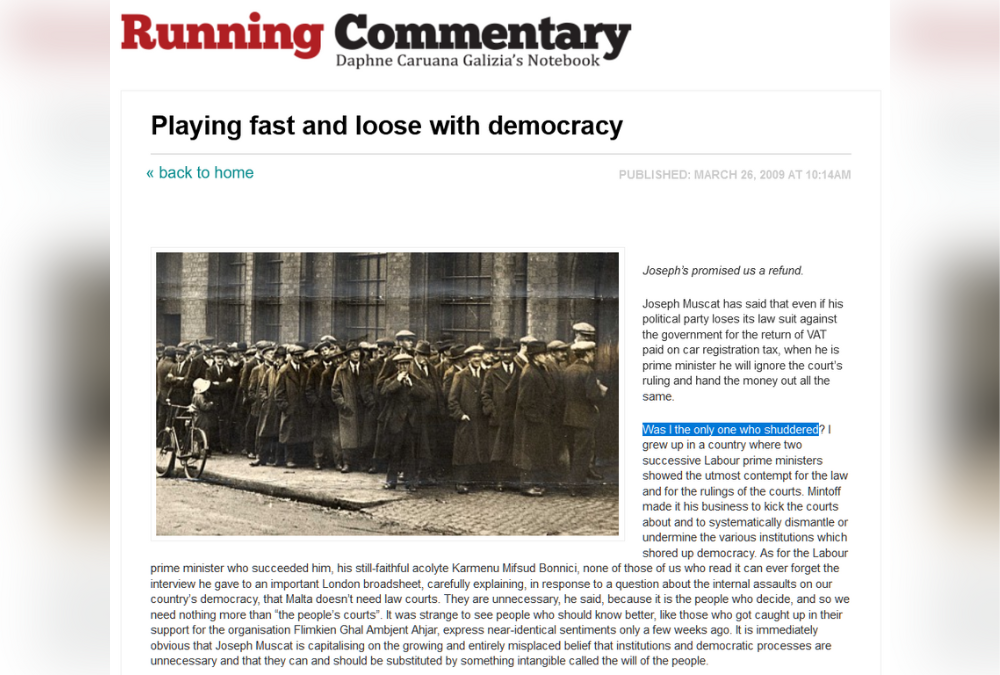One of the very first things Daphne wrote in 2009 was a scathing criticism of the propagators of the Nationalist Party’s far-right heritage, first and foremost among whom was then deputy prime minister Tonio Borg. On the same day, controversy had erupted over a state-mandated decision to ban a play about abortion.
True to form as ever, Daphne openly called for the director of the banned play, Adrian Buckle, to defy the censors and stage the play. In her piece about Borg’s passionate defence of the Nationalist Party’s most extreme conservative values, she described the deputy prime minister’s far-right views as repellent to the average liberal voter, perfectly capturing a snapshot of a sentiment that the public would increasingly begin to express.
In another piece published a few days later, she described how the public’s evident antagonism towards the Nationalist Party’s unrepentant conservatism was further compounded by “the discontent of boredom“, a sort of restless mind state which can occur when one’s life offers all basic necessities one could need but is nonetheless dominated by a sense of stagnant imagination. Rumblings of internal dissent within the Nationalist Party’s ranks themselves were also coming to the fore.
“When people are bored, they look for trouble, even if not quite consciously. They pick fights and start arguments or have adulterous affairs – anything to remind them that they’re still alive; anything to get their adrenalin going. Edgy boredom can provoke the electorate into switching a good government for a bad one, a capable prime minister for one who hasn’t a clue, a solid future for a short blip of gratification in the here and now,” Daphne mused, sounding somewhat worried.
It was, in fact, a pretty noxious cocktail: while Malta had endured the 2008 financial crisis with nary a scratch, the fact remained that when it came to advancement in civil liberties and human rights, there was stagnation, and people like Tonio Borg helped cement the feeling that the Nationalist Party was not willing to budge on matters like women’s reproductive rights.
This, mixed with a dash of heavy-handed censorship like the decision to ban Buckle’s play and, a few months later, the orders to censor Alex Vella Gera’s ‘Li Tkisser Sewwi‘, made the prospect of advancement in areas which the Nationalist Party’s far-right wing deemed off limits seem like a very distant possibility, fomenting further discontent against an aging government that was starting to show serious signs of fatigue.
This was the perfect context for the grand entrance of then Opposition leader Joseph Muscat’s progressive, pseudo-intellectual bandwagon.
Muscat was able to correctly gauge what the public wanted to hear, attempting to rebrand the Labour Party as a catch-all coalition of moderates – in fact, it quickly became apparent that he was willing to say anything he thought would be populist and vague enough to extract the maximum amount of mass appeal possible.
Daphne wasn’t the only one who could sense that Muscat was not a credible leader but was instead one who was adept at picking up public sentiment and manipulating it to his advantage.
One example is how Muscat’s xenophobic rhetoric against migrants and refugees, along with his constant bluster and fantasies of strong-arming the European Union into following Malta’s whims, went down so well with the Labour Party’s grassroots that it remains a cornerstone policy of the Labour government today, more than 14 years after Muscat first made it his own in his first year as Leader of the Opposition.
Muscat even went as far as taking a ridiculous gamble – which later backfired disastrously – by using the Labour Party to file a lawsuit against the government for VAT paid on car registration tax. Playing to the gallery like a stubborn lute player chasing a nonreciprocating damsel, he even publicly stated that if the party lost (which it did) the case, he would ignore the court’s ruling and refund the VAT contributions regardless.

Muscat’s sole objective seemed clear. The primary goal was to capitalise on any perception of dissatisfaction around the country while ratcheting up the ONE propaganda machine to the point where falsehoods and realities sat afloat on top of each other like oil on water, especially in the context of the MEP elections that year. Muscat was gunning for his first win against Gonzi, and was willing to say anything to get it.
If dissatisfaction was not present or not suited to the Labour Party’s agenda, the propaganda machine manufactured it by consistently seeking to stir controversy even when it was not present.
Of course, the irony of the fact that one of Malta’s greatest anti-EU campaigners in the ‘Yes/No’ referendum had ascended to the leadership of the Labour Party after raising his profile through a stint as an MEP himself was certainly not lost on Daphne. In fact, out of all the poisonous rhetoric, all the populist tirades, and all the posing and pretenses, one thing Daphne could not bring herself about to forgiving Muscat for was his involvement in the anti-EU campaign.
“Despite knowing the outcome well ahead of time, I’m going to savour every minute of yet another opportunity to vote against those who fought like hell to prevent Malta from entering the European Union. When I think how hard they worked to achieve that reprehensible end, and what the consequences would have been for the country, and especially for my children’s generation and for generations to come, I break out in a cold sweat. I think I must be suffering still from the post-traumatic stress brought on by those few hours of waiting while the referendum votes were counted.”
In fact, the Labour Party found itself in an awkward position whenever it was asked to justify its volte-face over Malta’s decision to join the EU, with then MEP candidate Edward Scicluna coming under fire multiple times for refusing to state what he had voted for when the EU referendum was held.
Nonetheless, in spite of the relatively visible lack of conviction and ideology gluing together the rapidly burgeoning bandwagon of progressive moderates, Muscat did succeed in building a cult-of-personality around himself, attempting to live up to the archetype of New Labour’s Great Leader, as it were.
Saviour Balzan’s Malta Today had handed the Labour Party an olive branch when it published a backdated story about then finance minister Tonio Fenech’s trip with Tumas Group’s George Fenech, which Muscat’s bandwagon naturally turned into an absolute field day.
That particular story and the way the Labour Party ran with it to the ends of the earth and back was a symbolic prototype of what was to become an integral part of the Labour Party’s battle plan for the next five years: to inflate and propagate stories and narratives which caused the maximum amount of damage to the Nationalist Party while always deflecting away from what the Labour Party was going to be actually doing instead of it should it be elected to government.
As we now know, this was a sleight-of-hand trick that Muscat would go on to master over the years to come.


